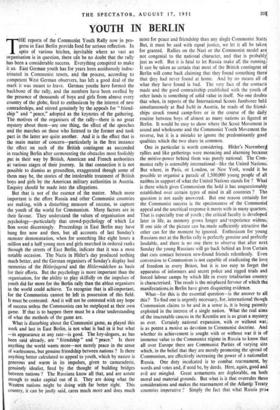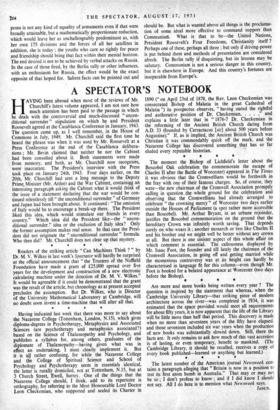YOUTH IN BERLIN
THE reports of the Communist Youth Rally now in pro- gress in East Berlin provide food for serious reflection. In spite. of various hitches, inevitable where so vast an organisation is in question, there can be no doubt that the rally has been a considerable success. Everything conspired to make it so. East German youth has for years been assiduously indoc- trinated in Communist tenets, and the process, according to competent West German observers, has left a good deal of the mark it was meant to leave. German youths have formed the backbone of the rally, and the numbers have been swelled by the presence of thousands of boys and girls from almost every country of the globe, fired to enthusiasm by the interest of new comradeships, and stirred genuinely by the appeals for " friend- ship" and " peace," adopted as the keynotes of the gathering. The motives of the organisers of the rally—there is no great mystery about them—are one thing, the effect of the speeches and the marches on those who listened to the former and took part in the latter are quite another. And it is the effect that is the main- matter of concern—particularly in the first instance the effect on such of the British contingent as succeeded in reaching Berlin after surmounting the obstacles most foolishly put in their way by British, American and French authorities at various stages of their journey. In that connection it is not possible to dismiss as groundless, exaggerated though some of them may be, the stories of the intolerable treatment of British boys and girls by the American military authorities in Austria. Enquiry should be made into the allegations.
But that is not of the essence of the matter. Much more important is the effort Russia and other Communist countries are making, with a disturbing measure of success, to capture the youth of the world for Communism. Many factors are in their favour. They understand the values of organisation and psychology—particularly that crowd-psychology of which Le Bon wrote discerningly. Proceedings in East Berlin may have hung fire now and then, but all accounts of last Sunday's monster demonstration, when for something like eight hours a million and a half young men and girls marched in ordered ranks through the streets of East Berlin, indicate that it was a most notable occasion. The Nazis in Hitler's day produced nothing much better, and the German organisers of Sunday's display had memories of the Hitlerjugend and the Hitlermadchen as basis for their efforts. But the psychology is more important than the organisation, for the ability to play skilfully on the impulses of youth did far more for the Berlin rally than the ablest organisers in the world could achieve. To recognise that is all-important, for the Communists cannot be left in possession of this field. It must be contested. And it will not be contested with any hope of success unless the Communists can be outplayed at their own game. If that is to happen there must be a clear of what the methods of the game are.
What is disturbing about the Communist game, as played this week and last in East Berlin, is not what is bad in it but what —in appearance at any rate—is good. The key-slogans, as has been said already, are " friendship " and " peace." Is there anything the world wants more—not merely peace in the sense of warlessness, but genuine friendship between nations ? Is there anything better calculated to appeal to youth, which by nature is generous and warm in its impulses, given to camaraderie, genuinely idealist, fired by the thought of building bridges between nations ? The Russians know all that, and are astute enough to make capital out of it. They are doing what the Western nations might be doing with far better Tight. This country; it can be justly said, cares much more and does much more for peace and friendship than any single Communist State4 But, it must be said with equal justice, we let it all be takel for granted. Rallies on the Nazi or the Communist model are not congenial to the national character, and that is probably just as well. But it is fatal to let Russia make art the running It can be taken as certain that most of the British contingent ad Berlin will come back claiming that they found something therm that they had never found at home. And by no means all what they have found is bad. The very fact of the contacts' made and the good comradeship established with the youth of other lands is something of solid value in itself. No one doubts that when, in reports of the International Scouts Jamboree held simultaneously at Bad Ischl in Austria. he reads of the friend. ships struck round camp-fires or in the course of the daily routine between boys of almost as many nations as figured at Berlin. It would be easy to show where the Scout Movement is sound and wholesome and the Communist Youth Movement the reverse, but it is a mistake to ignore the predominantly good qualities which the two share in common.
One in particular is worth considering. Hitler's Nurembergi rallies and like gatherings were menacing and alarming because the motive-power behind them was purely national. The Com-, munist rally is ostensibly international—like the United Nations; But where, in Paris, or London, or New York, would it be possible to organise a parade of 1,500,000 young people of all natitSns in support of what the United Nations stands for ? What is there which gives Communism the hold it has unquestionably, established over certain types of mind in all countries ? The question is not easily answered. But one reason certainly for the Communist success is the speciousness of the Communist appeal and the uncritical response it meets with in many quarters; That is especially true of youth ; the critical faculty is developed later in life, as memory grows longer and 'experience widens) If one side of the picture can be_made sufficiently attractive the other can for the moment be ignored. Enthusiasm for young Russians met at the Berlin rally is perfectly genuine and perfectly laudable, and there is no one there to observe that after next Sunday the young Russians will go back behind an Iron Curtain that cuts contact between new-found friends relentlessly. Even conversion to Communism is not capable of eradicating the lova, of freedom in every Briton, but it is too easy to forget the apparatus of informers and secret police and rigged trials and forced labour camps by which life in every totalitarian country is characterised. The result is the misplaced fervour of which thq • manifestations,in Berlin have given disquieting evidence.
What—for this is the essential question—is the answer to all this? To find one is urgently necessary, for, international though Communism claims to be and in a sense is, it is being patently exploited in the interest of a single nation. What the real aims of the inscrutable caucus in the Kremlin are is as great a mysterm as ever. Certainly national expansion, with or without war; is as potent a motive as devotion to Communist doctrine. And whether its achievement is sought with or without war it is of immense value to the Communist regime in Russia to know that all over Europe there are Communist Parties of varying size which, in the belief that they are merely promoting the spread of Communism, are effectively increasing the power of a nationalist Russia. One duty inculcated is to combat rearmament, by words and votes and, if need be, by deeds. Here, again, good and evil are mingled. Great armaments are deplorable, on both moral and material grounds. But what is it that overrules these considerations and makes the rearmament of the Allan* Treaty countries imperative ? Simply the fact that what Russia prof poses is not any kind of equality of armaments even if that were broadly attainable, but a mathematically proportionate reduction, which would leave her as unchallengeably predominant as, with her own 175 divisions and the forces- of all her satellites in addition, she is today ; the youths who care so rightly for peace and friendship should bring that fact within their mental horizon. The end desired is not to be achieved by verbal attacks on Russia. In the case of those fired, by the Berlin rally or other influences, with an enthusiasm for Russia, the effect would be the exact opposite of that hoped for. Salient facts can be pointed out and should be. But what is wanted above all things is the proclama- tion of some ideal more effective to command support than Communisni. What is that to be—the United Nations, President Roosevelt's Four Freedoms, Christianity itself ? Perhaps one of these, perhaps all three ; but only if driving-power is put behind them and methods of presentation are considered afresh. The Berlin rally is disquieting, but its lessons may be salutary. Communism is not a serious danger in this country, but it is elsewhere in Europe. And this country's fortunes are inseparable from Europe's.































 Previous page
Previous page